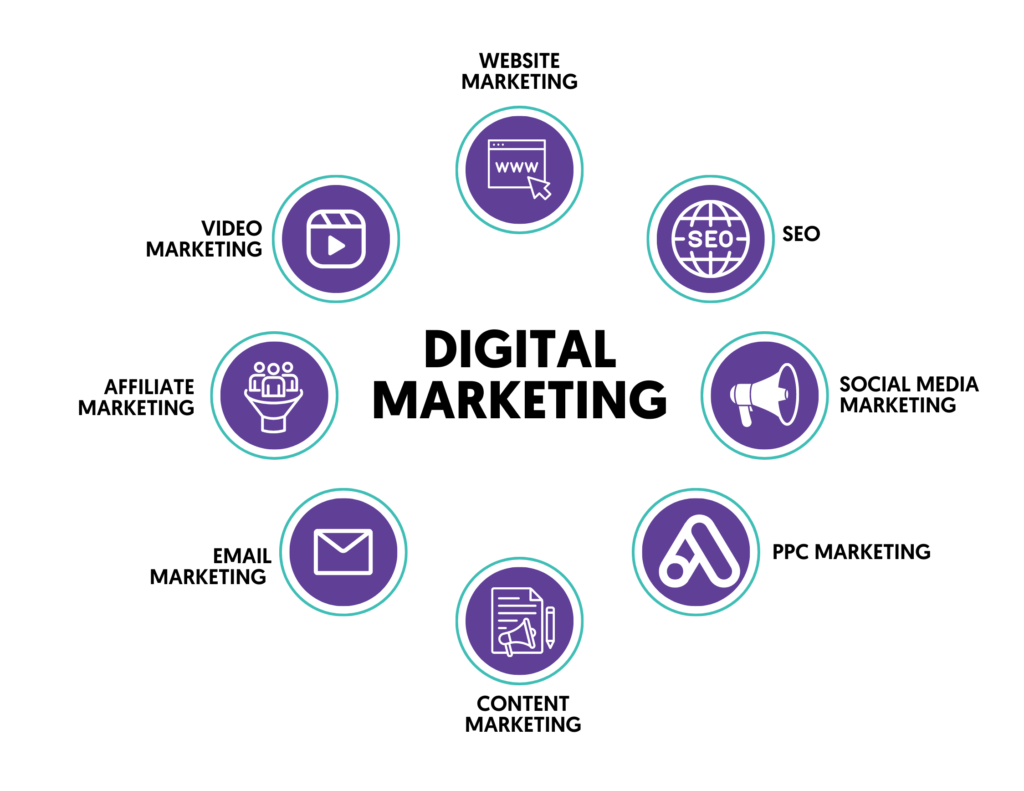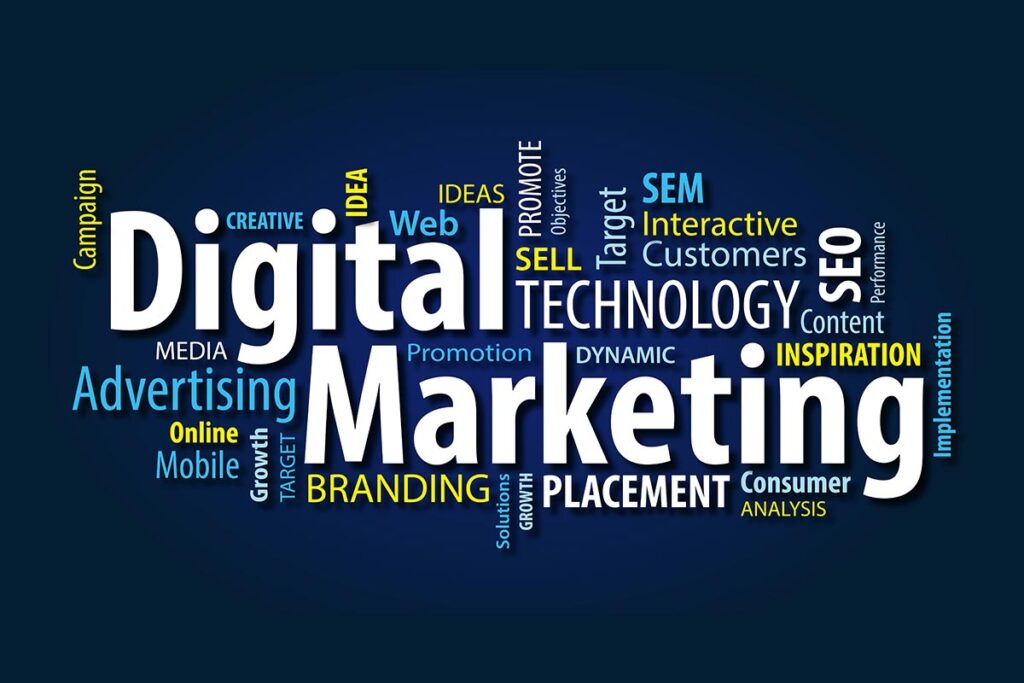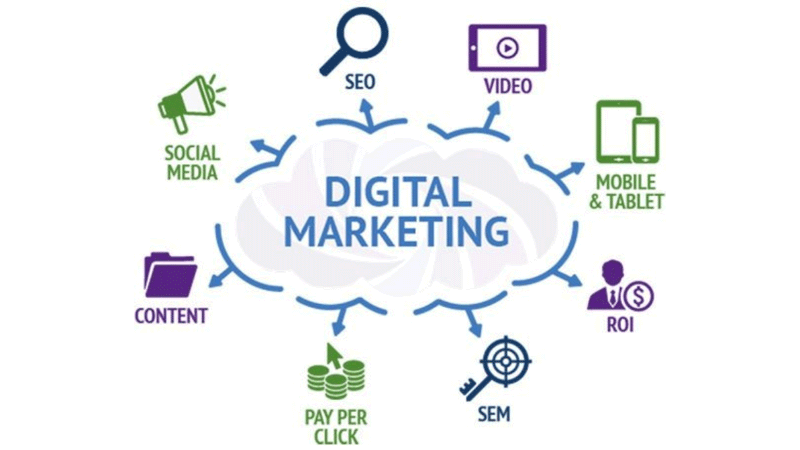What is the use of Digital Marketing?
- Definition and scope.
- Importance in today’s business environment.
- The rise of the digital world and its impact on marketing.
- The Evolution of Marketing
- Traditional marketing vs. digital marketing.
- How the internet has transformed the marketing landscape.
- The Significance of Digital Marketing in 2024
- How it’s used by businesses across industries.

2. Key Components of Digital Marketing
- Search Engine Optimization (SEO)
- What is SEO?
- Importance of SEO in digital marketing.
- On-page, off-page, and technical SEO.
- Keyword research and optimization.
- Content Marketing
- Role of content in digital marketing.
- Types of content: Blogs, videos, infographics, etc.
- Content creation, curation, and distribution strategies.
- Social Media Marketing
- The power of social media for marketing.
- Major platforms: Facebook, Instagram, Twitter, LinkedIn, TikTok, etc.
- Social media strategies for businesses.
- Email Marketing
- Building and segmenting email lists.
- Creating engaging email campaigns.
- Personalization and automation in email marketing.
- Paid Advertising (PPC)
- Google Ads, Facebook Ads, LinkedIn Ads, and other paid ad platforms.
- Setting up effective paid ad campaigns.
- Retargeting and remarketing strategies.
- Affiliate Marketing
- How affiliate marketing works.
- Setting up an affiliate marketing program.
- The pros and cons of affiliate marketing.
- Influencer Marketing
- Collaborating with influencers to promote products.
- Finding the right influencers for your brand.
- Measuring the success of influencer campaigns.
- Video Marketing
- The growing role of video in digital marketing.
- Platforms for video marketing: YouTube, TikTok, Instagram, etc.
- Best practices for creating effective video content.
3. The Digital Marketing Strategy Process
- Understanding Your Audience
- Defining your target audience.
- Market research and buyer personas.
- Customer journey mapping.
- Setting SMART Goals
- How to set specific, measurable, achievable, relevant, and time-bound goals.
- Budgeting for Digital Marketing
- Allocating a budget for various channels.
- Tracking ROI (Return on Investment) in digital marketing.
- Implementing and Executing the Strategy
- Building a cross-channel marketing campaign.
- Content calendar and marketing automation tools.
- Measuring and Analyzing Performance
- Tools for tracking digital marketing efforts: Google Analytics, HubSpot, etc.
- Key metrics: Traffic, engagement, conversion rates, etc.
- A/B testing and optimization.
4. Emerging Trends in Digital Marketing
- Artificial Intelligence and Automation
- AI in content creation and marketing.
- Chatbots and customer service automation.
- Predictive analytics and personalized marketing.
- Voice Search and Smart Devices
- The growth of voice search and voice-activated devices.
- Optimizing for voice search.
- Augmented Reality (AR) and Virtual Reality (VR)
- The role of AR and VR in marketing campaigns.
- Examples of brands using AR and VR.
- Blockchain in Digital Marketing
- How blockchain can improve transparency in digital advertising.
- The role of smart contracts and decentralized marketing.
- Interactive Content
- Quizzes, polls, interactive infographics.
- How they enhance engagement and lead generation.
- Personalization and Predictive Marketing
- Creating personalized marketing experiences.
- Using data to predict consumer behavior and optimize marketing strategies.

5. The Role of Data in Digital Marketing
- The Importance of Data-Driven Marketing
- Why marketers need data to make informed decisions.
- Collecting and analyzing customer data.
- Analytics Tools and Platforms
- Overview of popular tools like Google Analytics, SEMrush, Ahrefs, etc.
- Interpreting data to drive digital marketing strategies.
- Privacy and Data Protection in Digital Marketing
- GDPR and other privacy laws.
- Ethical considerations and customer trust.
- How to handle and secure customer data.
6. Case Studies and Success Stories
- Small Businesses and Digital Marketing
- How small businesses have leveraged digital marketing for growth.
- Examples of successful small business campaigns.
- Enterprise-Level Digital Marketing Strategies
- How large corporations approach digital marketing.
- Case studies from industry leaders like Amazon, Nike, etc.
- Non-Profit Organizations and Digital Marketing
- How NGOs use digital marketing to raise awareness.
- Successful campaigns that made an impact.
7. Challenges in Digital Marketing
- Staying Up-to-Date with Changes
- Keeping up with constantly evolving algorithms and platforms.
- Adapting to new tools and technologies.
- Competition and Market Saturation
- How businesses can differentiate themselves.
- The importance of brand uniqueness.
- Overcoming Ad Fatigue
- How to engage audiences who are overwhelmed by ads.
- Creative strategies to avoid ad burnout.
- Budget Constraints
- Digital marketing on a limited budget.
- How to achieve maximum ROI with minimal investment.
8. The Future of Digital Marketing
- The Increasing Importance of Automation
- How automation tools will dominate the future.
- AI, chatbots, and automated email marketing.
- The Role of Voice and Visual Search
- How voice search and visual search will impact digital marketing.
- Optimizing for new search behaviors.
- Sustainability and Ethical Marketing
- The growing demand for sustainable and ethical marketing practices.
- How brands are aligning with social and environmental causes.
9. Conclusion
- The Long-Term Benefits of Digital Marketing
- Digital marketing as an ongoing strategy for brand growth.
- Final Thoughts on the Future of Digital Marketing
- How businesses should prepare for the future of marketing.
- Call to Action
- Encourage businesses to embrace digital marketing to stay competitive.
Example of Key Sections Expanded
- Search Engine Optimization (SEO) SEO is one of the cornerstones of digital marketing. A well-executed SEO strategy can significantly increase the visibility of a website in search engines like Google, driving organic traffic and improving the website’s ranking for targeted keywords. The importance of SEO in digital marketing is underscored by the fact that over 60% of all website traffic originates from search engines.
- On-Page SEO: Optimizing website content, meta descriptions, and title tags for targeted keywords.
- Off-Page SEO: Building backlinks, establishing domain authority, and social signals.
- Technical SEO: Optimizing website speed, mobile responsiveness, and ensuring an easy-to-crawl structure for search engine bots.
- Content Marketing Content marketing is vital for creating meaningful connections with audiences. It involves creating and sharing valuable, relevant content to attract, engage, and retain customers. The types of content that work best in digital marketing include blog posts, case studies, whitepapers, videos, and infographics.
- Blogging: Regularly publishing high-quality blog content helps to improve SEO, drive traffic, and establish the brand as an authority in its industry.
- Video Content: Videos are increasingly popular for capturing attention on platforms like YouTube, Instagram, and TikTok. Video marketing has proven to increase conversions by up to 80%.
- E-books and Whitepapers: These are long-form content types that can help businesses generate leads by offering them in exchange for contact information.
- Social Media Marketing Social media platforms are powerful tools for engaging with audiences, driving traffic, and building a brand. From organic posts to paid ads, social media marketing allows businesses to target specific demographics, interests, and behaviors.
- Organic Social Media Strategies: Posting regular updates, engaging with followers, and creating content that sparks conversation and interaction.
- Paid Social Media Advertising: Using tools like Facebook Ads Manager and Instagram Ads to run targeted campaigns aimed at achieving business objectives, from lead generation to brand awareness.



